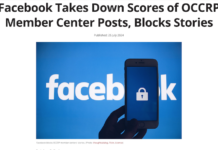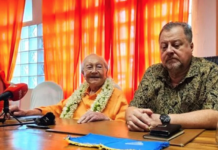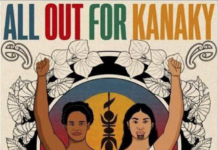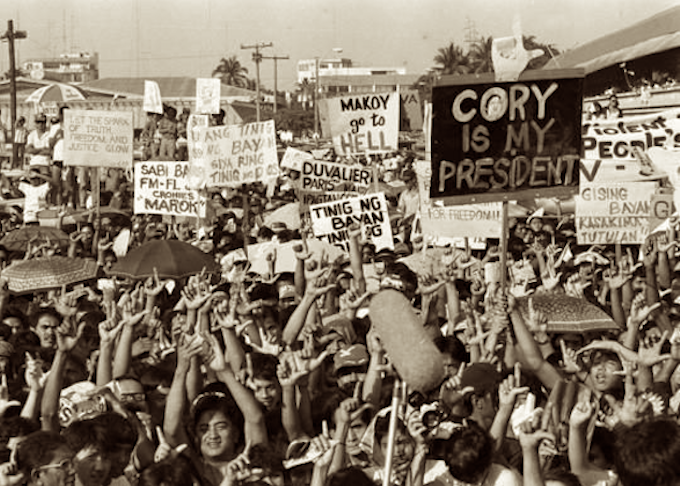
COMMENTARY: By Pacific Island Times publisher Mar-Vic Cagurangan
I remember that day — February 25, 1986. I was then a teenager. My family stood outside the iron gates of Malacañang Palace among a massive wave of people armed with yellow ribbons, flowers and rosaries.
After a four-day uprising, we heard on the radio that the dictator Ferdinand Marcos and his family had fled the country.
Ramming through the gates of the now forlorn presidential palace, people found signs of a hurtled retreat. Hundreds of pairs of shoes, gowns and other evidence of the Marcoses’ profligacy had been abandoned. Documents and bullets were scattered on the floor.
- READ MORE: Covid tames race to replace Duterte as Philippine president
- US, Philippines kick off their largest-ever military drills
- What’s the point of celebrating People Power?
- Other Philippine elections reports
They’re gone, the Marcoses!
People burst into song. The poignant “Bayan Ko” (My Country) — the metaphor of a caged bird that yearns to be free — was the anthem of the EDSA revolution: People Power.
The Marcoses had been obliterated from our lives.
Or so we thought.
My generation — we were called “The Martial Laws Babies” — is beginning to realise now that only the glorious part of Philippine history is being obliterated.
‘Bongbong’ Marcos the frontrunner
Ferdinand “Bongbong” Marcos Jr., only son and namesake of the late dictator, is the frontrunner in the Philippines’ upcoming presidential election in May. Polls in January and February show Marcos Jr. ahead in the race with 60 percent of the national vote.
He was 29 when the family was ousted and sent into exile in Hawai’i. He had since returned to the Philippines, where he served as governor of Ilocos Norte, as congressman and senator.
Now he is aiming to go back to his childhood playground — the Malacañang Palace.
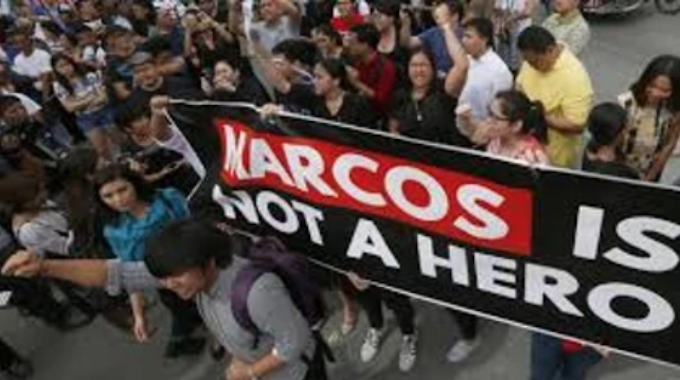
His campaign has revived “Bagong Lipunan” (The New Society), the anthem of martial law. I shudder. It summoned the dark years.
Now as an adult, watching how North Koreans live now gives me a perspective of how we were brainwashed into subservience during the martial period when the media was controlled by the regime.
Political opinions had no place in the public sphere. Dissidents disappeared, plucked out of their homes by military men, never to be seen ever again. Those who had heard of these stories of desaparecidos had to zip their mouths. Or else.
The government slogan “Sa Ikakaunlad ng Bayan Displina Ang Kailangan” (For the Nation’s Progress Discipline is Necessary) was forever stuck in our heads.
Marcos family’s extravaganzas
My generation lived through different political eras. We grew up watching the Marcos family’s extravaganzas. They acted like royalty.
Imelda Marcos paraded in her made-for-the-queen gowns and glittering jewelry, suffocating Filipinos with her absolute vanity amid our dystopian society.
“People say I’m extravagant because I want to be surrounded by beauty. But tell me, who wants to be surrounded by garbage?” she said.
“Bagong Lipunan” was constantly played on the radio, on TV and in public places. It was inescapable. Its lyrics were planted into our consciousness: “Magbabago ang lahat tungo sa pag-unland” (Eveyone will change toward progress.)
Marcos created a fiction depicting his purported greatness that fuelled his tyranny.
During the two decades of media control, the brainwashing propaganda concealed what the regime represented — world-class kleptocrats, murderers and torturers.
Marcos Jr. gave no apology, showed no remorse and offered no restitution. And why would he? Maybe no one remembers after all. None of the Marcoses or their cronies ever went to jail for their transgressions.
Marcos rewarded many times
Marcos Jr. has been rewarded many times, repeatedly elected to various positions. And now as president?
It’s perplexing. It’s appalling. And for people who were tortured and the families of those killed, it’s revolting.
Marcos Jr. appeals to a fresh generation that doesn’t hear the shuddering beat of “Bagong Lipunan” the way my generation does.
The Philippines’ median age is 25. Their lack of a personal link to the martial law experience perhaps explains their historical oblivion.
But history is still being written. Pre-election polls are just polls. The May 9 ballot will decide a new chapter in history.
As Filipino journalist Sheila Coronel said, “A Marcos return is inevitable only if we believe it to be.”
Mar-Vic Cagurangan is editor-in-chief and publisher of the Pacific Island Times in Guam. This article is republished with permission.









